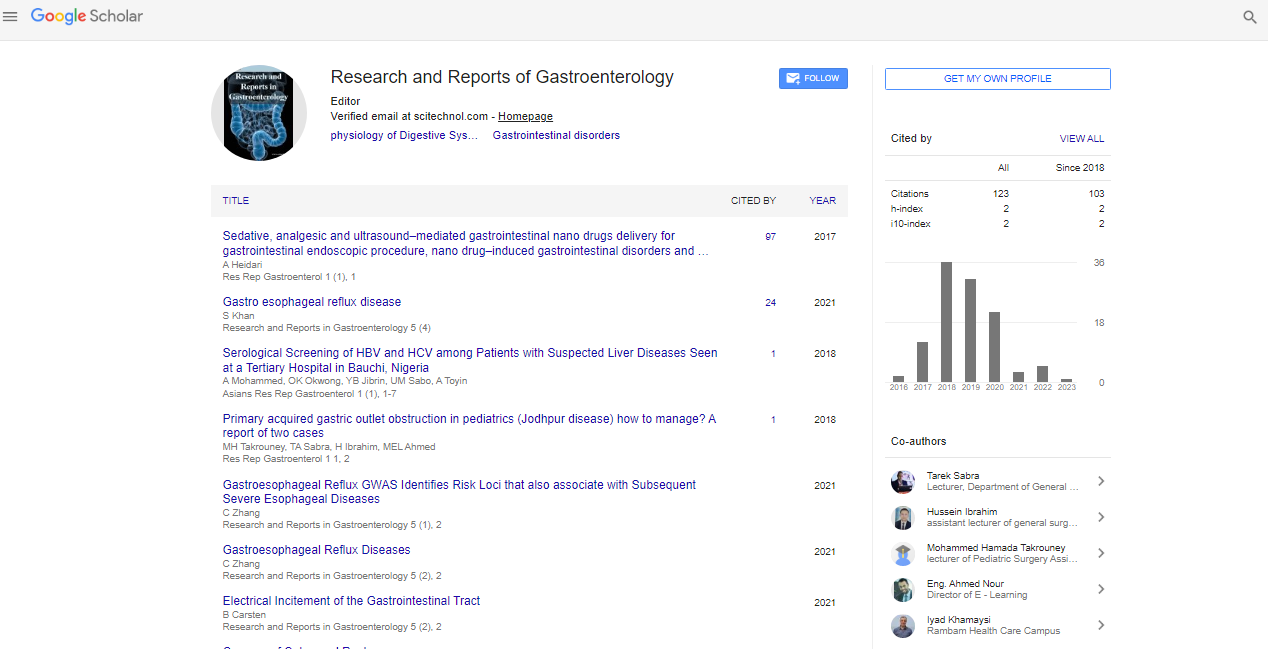Opinion Article, Res Rep Gastroenterol Vol: 7 Issue: 3
Exploring Pancreatic Diseases and their Management
Mathias Olesen*
1Department of Clinical Medicine, Aalborg University, Aalborg, Denmark
*Corresponding Author: Mathias Olesen,
Department of Clinical Medicine,
Aalborg University, Aalborg, Denmark
E-mail: olesenmathias@gmail.com
Received date: 23 August, 2023, Manuscript No RRG-23-118893;
Editor assigned date: 25 August, 2023, PreQC No RRG-23-118893(PQ);
Reviewed date: 08 September, 2023, QC No RRG-23-118893;
Revised date: 15 September, 2023, Manuscript No RRG-23-118893 (R);
Published date: 22 September, 2023, DOI: 10.4172/Rrg.1000149
Citation: Olesen M (2023) Exploring Pancreatic Diseases and their Management. Res Rep Gastroenterol 7:3.
Description
Pancreatic diseases encompass a range of conditions that affect the pancreas, a vital organ involved in digestion and blood sugar regulation. The pancreas, often an unsung hero of the digestive and endocrine systems, plays a crucial role in maintaining overall health. Located behind the stomach, the pancreas is responsible for producing enzymes that aid in digestion and hormones like insulin to regulate blood sugar levels. When this organ becomes afflicted with disease, it can lead to severe health complications. In this manuscript, we delve into various aspects of pancreatic disease, from common conditions to treatment options.
Pancreatic diseases:
Pancreatitis: This inflammatory condition can be acute or chronic. Acute pancreatitis is often caused by gallstones or excessive alcohol consumption and presents with sudden, severe abdominal pain, nausea, and vomiting. Chronic pancreatitis, on the other hand, develops slowly and can result from long-term alcohol abuse, smoking, or certain genetic factors. Both forms of pancreatitis can lead to digestive problems and diabetes.
Pancreatic cancer: Pancreatic cancer is one of the most aggressive and lethal cancers, often diagnosed at an advanced stage. Risk factors include smoking, obesity, a family history of pancreatic cancer, and certain genetic syndromes. Symptoms can be subtle and include weight loss, jaundice, and abdominal pain. Early detection and intervention are difficult for improved outcomes.
Cystic Fibrosis-Related Diabetes (CFRD): Cystic fibrosis patients are at risk of developing CFRD due to pancreatic insufficiency. The pancreas doesn't produce enough insulin, causing high blood sugar levels. CFRD management includes insulin therapy and a well-balanced diet.
Pancreatic pseudocyst: These fluid-filled sacs can develop after an episode of pancreatitis. They may resolve on their own, but in some cases, they require drainage or surgical intervention.
Autoimmune pancreatitis: This rare condition occurs when the body's immune system mistakenly attacks the pancreas, leading to inflammation and scarring. It can mimic pancreatic cancer, making accurate diagnosis crucial.
Diagnosis
Diagnosing pancreatic diseases involves a combination of physical examinations, imaging tests (CT scans, MRI, and ultrasound), blood tests (to assess pancreatic enzymes and blood sugar levels), and sometimes endoscopic procedures like Endoscopic Ultrasound (EUS) and Endoscopic Retrograde Cholangio pancreatography (ERCP). Early and accurate diagnosis is key to managing pancreatic diseases effectively.
Treatment
The management of pancreatic diseases depends on the specific condition:
• Treatment may involve hospitalization, fasting, pain management, and addressing the underlying cause. In chronic cases, lifestyle changes like alcohol cessation and a low-fat diet may be necessary.
• Treatment can include surgery, chemotherapy, radiation therapy, and newer approaches like immunotherapy and targeted therapy. Early detection is crucial for improving survival rates.
• Management focuses on insulin therapy, monitoring blood sugar levels, and maintaining a proper diet.
• Treatment options range from watchful waiting to drainage procedures or surgery, depending on the size and symptoms.
• Steroids and other immunosuppressive medications are often used to manage inflammation.
Pancreatic diseases represent a significant health challenge. Understanding the pancreas's role in digestion and hormone regulation is critical in comprehending the impact of these diseases. Timely diagnosis and appropriate treatment are essential to improve outcomes for patients with pancreatic conditions. Researchers continue to work diligently to advance our knowledge of these diseases and develop more effective treatment options, offering hope for those affected by pancreatic disease.
